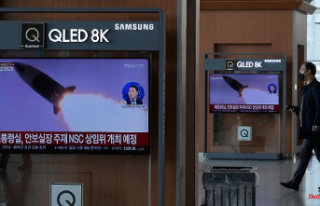At "Maybrit Illner", Economics Minister Habeck looks back on the challenges of the last few months. Another guest is Deutsche Bank boss Sewing. He gives the federal government good marks for crisis management.
After almost three years of the corona pandemic and nine months of war in Ukraine, Germany is in an exceptional situation. Inflation is 10 percent, according to Deutsche Bank boss Christian Sewing, it could fall to seven percent in the coming year. Nevertheless, Germany has proven itself in this special situation, said Federal Minister of Economics Robert Habeck on Thursday evening in a special edition of the ZDF talk show "Maybrit Illner". "The situation is now more manageable," says Habeck.
In the past few months, the federal government had to deal with several crises "that didn't give each other anything." There was the fear of a nuclear war, along with a lack of energy and high prices. "The federal government has considered all three side by side," says Habeck. In the end, politicians mastered the crises with social packages, an electricity and gas price brake and the promotion of renewable energies.
Nevertheless, there is dissatisfaction among the population, says moderator Maybrit Illner. Deutsche Bank boss Sewing contradicts: People are not dissatisfied, at most insecure. "I think the federal government acted very properly overall and reacted quickly," says Sewing, surprising the moderator. Then he adds: "We must now address the immediate crisis in terms of fighting inflation." The ECB has taken corresponding steps by raising the key interest rate.
The minister knows that some companies are currently in a difficult situation. The gas and electricity price brake offer relief here, even if not 100 percent. "We're preventing this country's economy from collapsing. But we can't prevent companies from having higher prices," says Habeck. An additional problem is that people consume less because they don't have the money. Habeck: "The political skill at the moment will be to align the state programs in such a way that we go into areas that are not overheated, so that we can continue to use state money to stimulate consumer behavior without fueling inflation."
It is important to support companies that have gotten into a crisis through no fault of their own, says Sewing. But he also knows: "We must not let such a program run permanently. We must use the year 2023 to get out of the recession and then in 2024 to get into a situation through economic growth, competitive energy prices and a secure energy supply that we don't have to do that anymore." With a bit of luck, inflation could fall below 5 percent in 2024, Sewing said. Effective steps would have to be taken now - such as the federal government's electricity and gas price brake.
Habeck agrees. "Fighting inflation is the number one task," he says. The second important task is to ensure that the current recession does not last too long. Both steps must take place in parallel, and the federal government supports this with energy price brakes and social measures to strengthen the purchasing power of the population.
The industry has now recognized the need for a transformation of the economy, praises Habeck. Industrial gas consumption has fallen by 25 percent in recent months, while production has only fallen by 1.5 percent. "We have the opportunity to create alternatives with energy efficiency, with new technologies, with electrification and, for example, with the rapid use of hydrogen," says Habeck.
Sewing and Habeck agree on many points - apart from extending the lifetime of nuclear power plants. And at the end of the show, both call for Europe to be strengthened as a location. Europe could take the USA as an example, where new companies could start up much more easily. Habeck: "Europe must pull itself together and find the strength to make joint decisions more quickly. This requires a political mandate. The EU must reform itself in such a way that Europe is perceived as a united voice in the world."












